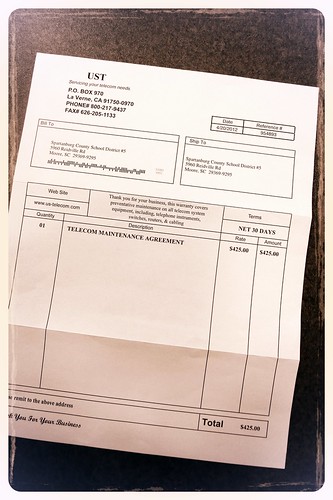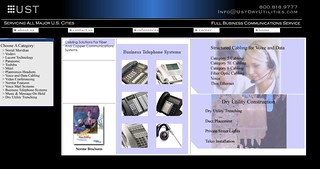Yesterday several of our schools received an invoice similar to the one above. The invoice is for a service agreement that “covers preventative maintenance on all telecom system equipment, including, [sic] telephone instruments, switches, routers, & cabling.” The bill was for $425, and since it included technology equipment, it wound up on my desk.
Of course, I had no clue what it was or from whence it had come. I keep track of all of our technology maintenance agreements, and I know all the companies with which we do business. This wasn’t one of them, and I began to smell a rat.
I checked their website, and it looked like a like a legitimate business site, offering the standard fare of switching and telephone equipment.
Still, though, I was skeptical. I know fake websites can be convincing. I called the 1-800 number on the invoice, was put on hold for about 15 minutes, then shunted into voice mail. That pretty much cemented my conviction that this was a scam, and I left voice mail stating as much.
This morning I checked with my counterparts from other districts around the state. Every one that responded said that they have received similar invoices from UST. They also pointed me to links confirming this group as a bunch of scam artists…
- Cease and Desist Order from North Dakota Attorney General for UST (PDF)
- Trustlink Comments regarding UST – most are negative
- Texas A&M Warning about Fraudulent Invoices – and a PDF example of said invoice
One of my colleagues actually got through to them on the phone, and what they were told was that this was an OFFER of services, and not an invoice. Neither the words “invoice” nor “bill” appear on the document, but the implication is that the amount is to be paid upon receipt within “Net 30 Days,” a phrase generally reserved for an invoice. If this was an “offer” and not an invoice, then it is intentionally deceiving.
It appears that UST was targeting public institutions, and was hoping that some bookkeeper would receive this and just go ahead and pay it. Fortunately, our folks knew to question it, but I wonder how many around the US fell for this. If they are so deceptive with their practices, I also have to question the quality of their maintenance “services.”
I guess with everyone now learning how to recognize, filter, and ignore spam and e-mail scams, UST decided to use good old paper and snail mail. With e-mail so common, there seems to be an air of authority about a document you can hold in your hand. I’m sure there were some that did fall for it.
I’ve had unscrupulous vendors attempt to scam me over the phone. They would call offering a “sample” of a product, but when questioned, had to reveal that there was nothing free, nor free from obligation about the offer. I’ve heard other tales of someone at a school accepting a free offer of supplies, be they technology, cleaning, or something else, only to receive exorbitant invoices later. Our finance director told me that one company sent materials unsolicited, THEN tried to bill for those materials. He said he dumped both the materials and the invoices in the trash.
I guess there will always be someone trying to scam the system, but it just makes my blood boil when I see it in action. I really hope UST doesn’t get any takers on this fraudulent action, and won’t be able to cover their cost of mailing this junk.


I really wish stuff like this could be prosecuted and crushed as on its face illegal. Legitimate businesses don’t or at least should not work like this.
I’ve been getting spam type stuff masquerading as messages from Amazon about a “cancelled order” and “YouTube Services.” When i looked at the Amazon message, posing as a “canceled order” message, there was a link that, on examination, appeared to lead to somewhere other than Amazon. Even on a Mac, I didn’t click it. I’m anxious about the possibility of java or other cross platform enabled trojan horses or other beasties. It’s frustrating that folks can barrage the public with such stuff, yet there is little that can be done to stop it.